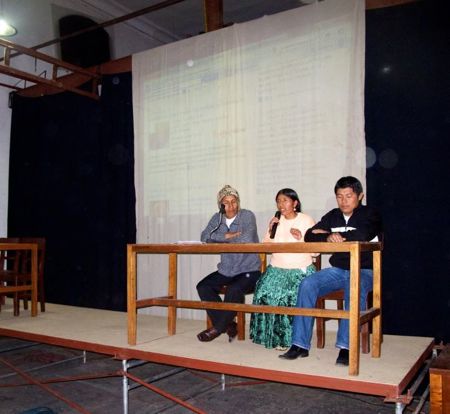The three-day event “Conectándonos” (Connecting) was purposely limited to 35 participants and 5 facilitators. This small size allowed greater interaction and personal connections among the workshops attendees. However, we know that the subject of greater participation in the Bolivian online space is a conversation that should be had with the wider community. For that reason, as part of the gathering, a public event was held on the evening of December 13th [es] [1], which was free and open to the general public.
This is the program for the event, which featured speakers from among those participating in the gathering, as well as some invited guests.
Presentation: The Evolution of Digital El Alto
Presenter: Mario Durán Chuquimia (El Alto)
Up until a few years ago, the number of bloggers in El Alto, a city of more than one million residents, could be counted on a single hand. Now, it is a dynamic digital city, where young people access the internet more than in any other city in the country. We'll hear about this history and about some of the initiatives that are helping reduce the digital divide in El Alto. We'll also hear the experiences from one of these veteran bloggers and others that are using citizen media to show another side of the city to the rest of the country and to the rest of the world.
Presentation: How to Connect in Bolivia
Presenters: Annelissie Arrázola y Jessica Olivares (Santa Cruz)
We know that social networking sites provide greater opportunities for communication. However, to reduce the digital divide and encourage greater participation, connections in ‘real life’ are more important than ever. These digital initiatives and training projects require partnerships and alliances to ensure a wider reach and greater success. In this presentation, two leaders from the city of Santa Cruz spoke about their experiences with the creation of these connections in order to make things happen.
Discussion: The First Steps Toward a More Responsive Public Sector
Moderator: Wilfredo Jordán (El Alto)
Panelists: Marisol Murillo Velásquez, Vice-Ministry of Defense of Consumer Rights (@consumidorbo [3])
Juan Carlos Uribe Mendieta – Virtual Citizenship [4], CERES
Diego Andrés Gonzales Rioja – Community Manager of the Autonomy Statute Process, Departamental Assembly of Cochabamba (@asambleacbba [5])
Government agencies and public institutions are recognizing more and more about the importance of the internet as an important means to interact with citizens. Facebook pages and Twitter accounts of some of these entities allow for greater communication with citizens. These initiatives are a good first step, but how they can reach more people, especially those large sectors of society without regular access to the internet?
Discussion: Native Languages in Cyberspace
Moderador: Eduardo Ávila, Global Voices,
Panelistas – Ruben Hilare (El Alto), Victoria Tinta (El Alto), Ignacio Tomichá Chuvé (Santa Cruz)
There are more than thirty native languages spoken in Bolivia, many of which are in danger of disappearing. It is very difficult to find content in these languages when one makes an internet search. We'll talk about some of the challenges that indigenous communities face in regards to using these languages on the internet, as well as talk about some of the initiatives that are helping to promote the use of these languages on blogs, Facebook, Twitter, and YouTube, as a way to encourage new generations to revitalize these languages.
Presentation: A Safer Platform for Interaction
Presenter: Juan Ernesto Luna Ulloa (El Alto), National Coordinator of the Bolivian Youth Diversity Network [7]
The LGBT community in Bolivia has often had to hide in the shadows due to intolerance and discrimination from sectors of society. For this reason, some bloggers from the LGBT community felt the need to write anonymously. Despite the fact that in some parts of the country, things are slowly changing, social networking sites provide a safer platform for members of this community to express themselves without facing the same risks that exist outside of the virtual world. In addition, these connections with others through these networks reduce the feeling of isolation that some often experience.

